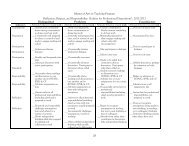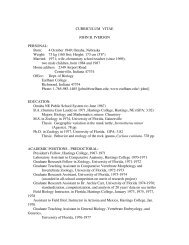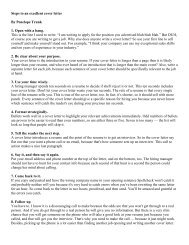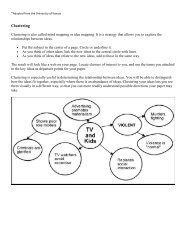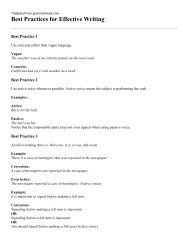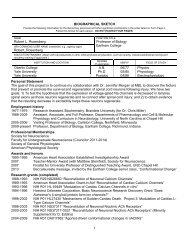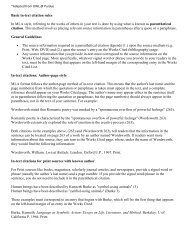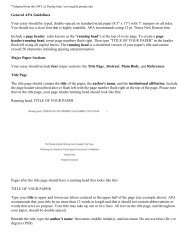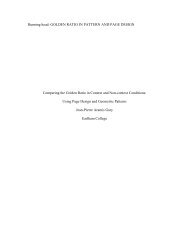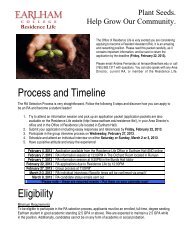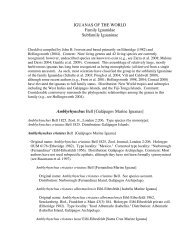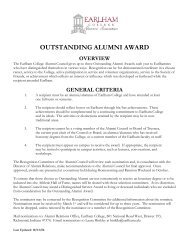August Wilderness Water Enrollment Packet - Earlham College
August Wilderness Water Enrollment Packet - Earlham College
August Wilderness Water Enrollment Packet - Earlham College
You also want an ePaper? Increase the reach of your titles
YUMPU automatically turns print PDFs into web optimized ePapers that Google loves.
Center for Environmental ActionTo <strong>Water</strong> <strong>Wilderness</strong> Participants:Welcome to <strong>August</strong> <strong>Wilderness</strong>! This enrollment packet has all the forms and information you willneed to get ready for your upcoming course this summer. Please be sure to review the packetcarefully and take special note of what items need to be completed and returned (see checklistbelow).Forms to be completed and returned by July 1 st , 2013:qqqArrival and Program Questionnaire Form<strong>Earlham</strong> Health Form (sent to you under separate cover)Permission Slip (for students who will be under the age of 18 by the course start date only)Items for your information and reference:• Essential Course Information• Course Curriculum Information• Equipment List• Liability InformationBefore getting too caught up in the following paperwork in this packet, we want to make a specialnote about the <strong>Earlham</strong> Health Form, which was previously sent to you by the <strong>College</strong> with youradmission materials. This form, including a required physical exam must be on file with <strong>Earlham</strong>Health Services by July 1 st in order for you to participate in the program. Please schedule anappointment with your doctor as soon as possible to ensure it gets completed in time.We will be sending additional academic information (course syllabus and readings) separately inJune. All the included forms are also available on-line at the <strong>August</strong> <strong>Wilderness</strong> websitewww.earlham.edu/augustwilderness. We look forward to seeing you in a few short months! If youhave questions, feel free to contact our office at (765) 973-2121. We can also be reached by email atwilderness@earlham.edu.Sincerely,Jay W. Roberts,Director, Center for Environmental ActionAlexia N. Springer,Field Programs Coordinator, Center for Environmental Action<strong>August</strong> <strong>Wilderness</strong> Program801 National Road WestRichmond, IN 47374-4095801 National Road West, Richmond, Indiana 47374-4095sprinal@earlham.edu • www.earlham.edu/augustwilderness • 765/973-2121 • FAX: 765/983-1207
Center for Environmental ActionESSENTIAL COURSE INFORMATION:Please Read Carefully!PAYMENTS AND REFUNDS:The cost of <strong>August</strong> <strong>Wilderness</strong> ($1,850) covers tuition, food and shelter during the course,transportation between <strong>Earlham</strong> and the program site, all specialized camping equipment, and othernormal course-related expenses except fishing licenses. Extraordinary expenses such as evacuations orunwarranted destruction of gear are not included.The balance of payments for <strong>August</strong> <strong>Wilderness</strong> ($1,850 minus deposit and scholarship) will beplaced on your <strong>August</strong> or September statement from <strong>Earlham</strong>. Payments should be sent directlyto Accounting and not the <strong>August</strong> <strong>Wilderness</strong> program.Due to the specialized nature of the program, there will be no refunds issued after July 1, 2013. Allrequests for refunds must be made in writing to the <strong>August</strong> <strong>Wilderness</strong> Office.PAPERWORK:The “Arrival and Program Questionnaire” provides us with important arrival details and moreinformation about your hopes and goals for the program. There are also questions concerning anymedical conditions a student may have that can help <strong>August</strong> <strong>Wilderness</strong> staff better prepare for fullparticipation on the program. In our experience, medical conditions ranging from deafness to diabeteshave had little impact on a student's ability to successfully participate in <strong>August</strong> <strong>Wilderness</strong>. However,for your safety and the safety of those around you, it is important that we know of the existenceof any potentially restrictive medical conditions. We reserve the right to decline an applicant andrefund the deposit when student health and/or safety is likely to be endangered by his or herparticipation. Please note that this form is different than the Health Record previously sent by thecollege with other admissions materials. However, students must have completed BOTH to participateon <strong>August</strong> <strong>Wilderness</strong>. Program staff will arrange to obtain a copy of your college health record fromHealth Services before the program begins. Please do not send the <strong>Earlham</strong> Health Form with your<strong>August</strong> <strong>Wilderness</strong> materials.The “Assumption of Risk and Release of Liability” form helps you focus on the nature of <strong>August</strong><strong>Wilderness</strong> and on your part in making it a safe and productive program. It is provided here for yourinformation. Please read it carefully. You do not need to sign it and return it. We will have you completethis form upon arrival to campus.The “Permission Slip” is only for students who will be under the age of 18 when the program begins.This form will be presented to border officials when entering and leaving Canada. It requires thesignature of a parent or legal guardian.801 National Road West, Richmond, Indiana 47374-4095sprinal@earlham.edu • www.earlham.edu/augustwilderness • 765/973-2121 • FAX: 765/983-1207
Center for Environmental ActionIDENTIFICATION:Students on <strong>Water</strong> <strong>Wilderness</strong> must bring their passport with them to campus on Arrival Day.Border officials require a passport when crossing into Canada. Passports will be held by the staffduring the drive and will be locked up with our outfitter while students are on the trail. Failure tobring a valid passport will prevent a student from being able to participate in the course. If you arenot a US Citizen, please note on your Arrival and Program Questionnaire your country ofcitizenship, as a visa may be necessary.ILLNESS AND INJURY:Injuries and illness are not common on <strong>August</strong> <strong>Wilderness</strong>, but they can occur. Our staff membersare trained in first aid and carry sufficient resources for emergency medical services if they arerequired. When severe injury or illness requires evacuation and/or professional medical care,the injured person is responsible for all costs incurred on her or his behalf.* This includes thecost of transportation from the backcountry to medical facilities. If the illness prevents theparticipant from returning to the wilderness, he or she must pay the cost of public transportationhome. Insurance may cover medical expenses and sometimes covers evacuation costs. Coverage forentering students enrolling in <strong>Earlham</strong>'s health insurance plan begins on the first day of <strong>August</strong><strong>Wilderness</strong>. We strongly recommend looking into additional supplemental travel insurance(information provided at the end of this document).BEHAVIOR ON COURSE:As a venture of <strong>Earlham</strong> <strong>College</strong>, <strong>August</strong> <strong>Wilderness</strong> maintains certain standards for student andstaff behavior. We reaffirm the social rules and expectations stated in the Community Principles andPractices document. Because <strong>August</strong> <strong>Wilderness</strong> has specific educational objectives and takes placein particularly unique settings, the program adds its own expectations or restates <strong>College</strong> positionsmore forcefully. We especially consider with utmost seriousness the <strong>Earlham</strong> communityexpectations that "members will treat each other with respect and dignity" and that they "will actwith concern for the safety and well-being of others.”Our expeditions are demanding. Safety and learning depend on maintaining physical and mentalcondition. The use of recreational drugs, including tobacco and alcohol, can detract fromperformance, and is not permitted.<strong>August</strong> <strong>Wilderness</strong> is deliberately coeducational. On arrival day, students are assigned to coedexpedition groups of approximately 7 students under the leadership of two or three staff members.In the field, each group will travel as a unit—tenting and learning together. They will share thephysical load and camp duties. The maintenance of morale in this close living situation isincompatible with sexual license and exclusive pairings. Participants are expected to refrain fromsexual relationships during the program.Violation of the above rules and expectations is grounds for immediate dismissal from the programwhile on campus or in the field. Acceptance of admission on the program involves acceptanceof its standards.801 National Road West, Richmond, Indiana 47374-4095sprinal@earlham.edu • www.earlham.edu/augustwilderness • 765/973-2121 • FAX: 765/983-1207
Center for Environmental ActionIMPORTANT:When behavior issues require dismissal from the course, the student is responsible for allcosts incurred on her or his behalf.* This includes the cost of transportation from thebackcountry to airports and/or bus stations. Dismissed students will not be permitted to return to<strong>Earlham</strong> until the designated arrival time period for New Student Week. Parents and/or guardianswill be expected to assist with transportation logistics and pay all necessary costs.ARRIVAL AND CHECK-IN:Registration for <strong>August</strong> <strong>Wilderness</strong> will be from 10:00 to 11:00 AM Eastern Daylight Savings Time(New York time) Saturday, July 27 th , 2013 in the Orchard Room in Runyan Center located on thesouth side of campus between Athletics, Wellness Center, and Stout Meetinghouse (follow signs).Families who accompany <strong>August</strong> <strong>Wilderness</strong> students to Richmond are welcome to join us for awelcome ceremony from approximately 11:15-11:45 AM. After registration students will be “onprogram," and should not count on having free time. Letter writing, phone calls, and last minuteshopping should be completed before 11 am. On Saturday afternoon your instructors will issue yoursleeping bag and other equipment, inspect the clothing and gear that you have brought for use on theprogram, and direct you in other activities to ready you for the field. You will be on the road Monday.TRANSPORTATION:Shuttles are available for those arriving on public transportation. A Dayton Airport pick-up is alsoavailable (we strongly recommend a Friday afternoon arrival if flying). For all transportation, pleasecomplete the necessary information on the enclosed “Arrival and Program Questionnaire”form.If you find it necessary to arrive on Friday, we have made special arrangements with Quaker HillConference Center (a 5-minute drive from campus) for student lodging at a reasonable rate (765-962-5741). Reference <strong>August</strong> <strong>Wilderness</strong> when you call. Meals will be on your own, and there arerestaurants and a grocery store within walking distance. A van will be available to transport you andyour gear to campus on Saturday at 10:30 AM.You may bring all of your clothing and furniture for fall term, and it will be stored in a locked room.Before arriving on campus you will separate clothing and outdoor equipment that you plan to use on thecourse from any other baggage that is to be stored at <strong>Earlham</strong>, and tag all items to be stored with yourname. Small valuables, including money, tickets, and the like, can be secured in a locked area. You willnot need money during the <strong>August</strong> <strong>Wilderness</strong> Program.MAIL AND MESSAGES:There is no easy way to contact students once they begin hiking or canoeing. In case of an emergencyyour family may contact the <strong>August</strong> <strong>Wilderness</strong> Program at (765-973-2121) or via campus security (765-983-1400).There will be no mail pickup or delivery in the field. Mail addressed to "Student's Name, <strong>Earlham</strong><strong>College</strong>, Richmond, IN 47374-4095" will be waiting in your individual mailbox when you return tocampus, as will Student Development mailings normally sent to student homes in <strong>August</strong>.801 National Road West, Richmond, Indiana 47374-4095sprinal@earlham.edu • www.earlham.edu/augustwilderness • 765/973-2121 • FAX: 765/983-1207
Center for Environmental ActionPROGRAM CONCLUSION:<strong>August</strong> <strong>Wilderness</strong> will end around noon the day before the official start of New StudentOrientation. You may move into your dorm room on that Thursday afternoon. Families may joinus for closing activities in front of Bundy Hall at approximately 11:30AM on Thursday. NewStudent Week activities will commence Friday morning.If you have questions or reservations regarding the information presented, please contact the <strong>August</strong><strong>Wilderness</strong> Office.* We strongly recommend looking into trip insurance programs to avoid undue financial burdensbrought about by medical field evacuations (expenses for evacuations can exceed $2500). We havemade arrangements with MH Ross Travel Insurance to provide this service if you so choose (plansbegin at $55). To purchase insurance or to obtain more information, call (866) 453-9826 and ask tospeak with Julie Baker or Sherry Michat. Evacuations for behavioral circumstances are not includedin this service.801 National Road West, Richmond, Indiana 47374-4095sprinal@earlham.edu • www.earlham.edu/augustwilderness • 765/973-2121 • FAX: 765/983-1207
Center for Environmental ActionWATER WILDERNESSCOURSE OVERVIEWFEATURES OF THIS COURSE:• River and lake paddling in and around Wabakimi Provincial Park, Ontario, Canada• 3-semester credit hours earned (Education 110)• Average Group Size: 7 students/ 3 instructors• Approximate pack/canoe weigh at heaviest: 50-75 lbs• Trip Duration: 19 days (11 field days)• Typical Male/Female ratio: 40/60COURSE OVERVIEW:Western Ontario’s beautiful “Caribou Forest” is the site of this course. It is a spectacular waterwayof lakes, rivers, bogs, and northern boreal forest. On this course you’ll receive an introduction to theessentials of wilderness travel in addition to learning more about yourself, your new peers andleaders, and <strong>Earlham</strong> <strong>College</strong>. You’ll cover a wide range of skills including minimum impactcamping, expedition canoeing, and outdoor leadership. There will be classes in geology, naturalhistory, wilderness ethics, consensus decision-making, and navigation (among others). You’ll workhard paddling the waterways and portaging over muddy, rocky terrain with a canoe or pack on yourback, but there will also be time to relax and enjoy the beauty of the area.As the course progresses, you will take on increasing responsibility for yourself and for the group.There will be some “solo” contemplative opportunities where you will get the chance to experiencea period of time in solitude and reflection. Near the end of the course, you will have the opportunityto test the skills you have acquired during an independent travel period where the instructors take areduced role and students determine the activities and route.This experience is a college-level, three-credit course (EDU 110). As such, there will be assignedreading and you will be expected to participate in all course discussions and related activities. Inaddition, there will be several assignments to complete in the form of journal essays andpresentations. Evaluation and grading on the course will be Pass/No Pass. Students will be given awritten and oral evaluation at the mid-way point and at the conclusion of the course.DRIVE OUTThe 17-day program breaks down to approximately three travel days to and from the wildernessarea, two logistics days at the beginning and end, and 11 days on trail. For these first few days in thecar, staff will be getting students acclimated to using backcountry gear—such as tents and stoves—as well as organization and preliminary safety lessons while staying at state parks or othercampgrounds along the way.BATHINGStudents have the opportunity to take a shower at the conclusion of the program at a campsite onthe car ride back to <strong>Earlham</strong>. During the 11-day wilderness component, "bird baths" in lakes andstreams keep us reasonably clean (you really don't notice it while in the backcountry). Students are801 National Road West, Richmond, Indiana 47374-4095sprinal@earlham.edu • www.earlham.edu/augustwilderness • 765/973-2121 • FAX: 765/983-1207
Center for Environmental Actiondiscouraged from bringing soap, shampoo, deodorant etc. on the trail as extra ounces turn into extrapounds rather quickly. Group equipment includes soap for hand-washing only.SLEEPING ARRANGEMENTSDuring all portions of the course—on campus, on the drive to and from the wilderness area, and onthe trail—students and staff will be sleeping in sleeping bags and tents. <strong>August</strong> <strong>Wilderness</strong> isdeliberately coeducational, including in sleeping arrangements. Participants are expected to refrainfrom sexual relationships during the program.PHYSICAL CONDITIONING:Conditioning before your course is important for your safety and the safety of others. It will also addto your enjoyment of the wilderness experience. We cannot emphasize enough the importance ofstarting a conditioning routine well before your course. We want to encourage, not intimidate you.<strong>August</strong> <strong>Wilderness</strong> can be strenuous, but the physical challenges are well within the ability of aperson in good general fitness. Being in shape will not guarantee you an easy time on your coursebut it will allow you to focus on learning skills, enjoying the companionship of others, and thebeauty of the natural landscape.<strong>August</strong> <strong>Wilderness</strong> requires both strength (lifting packs, paddling boats) and stamina (long daysportaging or in boats). In addition to doing strength training, be sure to do endurance relatedactivities such as jogging, hiking, cycling, or swimming. Anything that gets your heart rate up formore than 30 minutes will help build your aerobic fitness.If you’re beginning a fitness routine, start slowly. Aim for three sessions a week for about 30-45minutes each. Gradually increase length and frequency.801 National Road West, Richmond, Indiana 47374-4095sprinal@earlham.edu • www.earlham.edu/augustwilderness • 765/973-2121 • FAX: 765/983-1207
Center for Environmental ActionWATER WILDERNESSPERSONAL CLOTHING & EQUIPMENT LISTTHE IMPORTANCE OF YOUR CLOTHING:Dressing for comfort and safety is one of the important lessons of <strong>August</strong> <strong>Wilderness</strong>. A majorconsideration in outfitting is selecting fabrics that will keep you warm even when they are wet. Anumber of synthetics developed specifically for outdoor use (e.g. polyester fleece, Capilene® orPolartec® ) will keep you warm when they are wet and are quick drying, light weight, and compresswell when stuffed into your pack. Wool is a natural fiber that insulates even when wet, but it has thedisadvantages of being slow-drying and relatively heavy. Cotton is not acceptable on any clothingwith the exception of your road clothes and one trail t-shirt as it does not dry well and canbe deadly in the backcountry.Shop now (see suggestions at the end of this document). Visit outdoors stores and get an idea ofwhat's available. Order catalogs and compare. And buy good quality. Your clothing will compriseyour primary shelter for the month you are on the program. It is important for you to have all of thenecessary personal equipment and clothing before arriving in Richmond on Arrival Day. All clothingfor <strong>Water</strong> <strong>Wilderness</strong> must be roomy, to allow for freedom of movement and aeration. On colddays, you will be wearing all of your warm clothes, and they should fit comfortably when layered.When moderate to heavy garments are mentioned, we MEAN moderate to heavy, not light. Latesummer in Canada can have freezing temperatures and in some years we have had rain a majority ofthe days. Although this isn't typical, we must be prepared for the most difficult weather we mayencounter. You will note from the following list that we expect you to have at least three layers ofwarm clothing for the trunk of your body. If you get cold easily and are uncertain whether that willbe enough, bring four layers. REMEMBER: There is no substitute for appropriate synthetics orwool, which can provide adequate heat retention even when wet.If you have any questions about particular pieces of clothing or equipment, feel free to contact us at(765) 973-2121, or wilderness@earlham.edu. We will be happy to help.ABOUT THE LIST:The checklist is broken up into five sections:• Footwear• Upper Body Layers• Lower Body Layers• Personal Items• Optional ItemsEach section will list the item (socks) and the number of that item required (4 pairs). Although youmay bring more than the required amount, we discourage it. Your packs will be very heavy andextra ounces quickly add up to extra pounds. Do not bring less than the required amount.801 National Road West, Richmond, Indiana 47374-4095sprinal@earlham.edu • www.earlham.edu/augustwilderness • 765/973-2121 • FAX: 765/983-1207
Center for Environmental ActionFOOTWEAROther than your rain gear, your footwear is one of the most important items you will bring. You’llneed boots and at least 4 pairs of socks. You will also want a pair of lightweight camp shoes (seebelow).Equipment Item Quantity Comments CheckboxBoots 1 pair You will need one pair of high-top bootsto be your “wet shoes.” These willprovide support and protection whilecarrying canoes through forestundergrowth, beaver swamps, andboulder-strewn portages. Count on yourboots being wet much of the day. See theend of this document for more detailedinformation on appropriate boots*.Camp Shoes 1 pair Running, tennis, or general athletic shoeto wear around camp and to act as aspare. Low tops are OK. Again, do notbring new, expensive shoes. River sandalsare not acceptable.Socks 4 pairs Heavy ragg wool or synthetic blends calflength.Thorlo® or Smartwool® are goodchoices. You may prefer one pair longenough to tuck pants into. 1 pair may becotton athletic socks for the drive801 National Road West, Richmond, Indiana 47374-4095sprinal@earlham.edu • www.earlham.edu/augustwilderness • 765/973-2121 • FAX: 765/983-1207
Center for Environmental ActionUPPER BODY LAYERSYou’ll need at least 3 insulating layers, plus a wind/rain proof layer, which must fit comfortably overeach other so that they can all be worn at the same time. If you tend to get cold easily, add a pile vestin addition to the other 3 layers.Equipment Item Quantity Comments CheckboxT-Shirt 1 We recommend Capilene® or othersynthetic t-shirts since they dry muchfaster. 50/50 blends are adequate. Cottonis OK here but will stay wet longer (usefulwhen it is hot, not so much when it iscold).Primary Layer 1 Light to midweight underwear top ofwool, polypropylene or other syntheticmaterial. Zip-T’s are useful for addedventilation.Secondary Layer 1 Medium-weight wool shirt, sweater, orpolyester pile of 100 or 200 weightPolartec® or equivalent.Top Layer 1 Heavy weight (Capilene® or Polartec®200 or 300). Extra large to fit over yourother layers and still allow freedom ofmovement.Wind/Sun/BugShirt (optional)1 Lightweight, breathable, nylon wind shelleither anorak or full-zip style. This alsomust fit over your other layers. Great,breathable option when it’s windy orrainy lightly.Rain Jacket 1 Hooded waist-thigh length rain jacket.Coated nylon or breathable fabrics suchas Gore-Tex® are acceptable. There aremany excellent (non-Gore-Tex) moreaffordable jackets on the market as well(Marmot, Mountain Hardware, SierraDesigns). Look for one with taped seams.Gloves 1 pair Light-medium weight wool or synthetic.Liner gloves work well. Ski gloves are notrecommended.Wool/Pile Hat 1 For cold days/evenings. A facemask orbalaclava is also acceptable.Sun Hat 1 Sun hat or baseball cap. Necessary for sunprotection on your face and ears and tokeep rain off your face.801 National Road West, Richmond, Indiana 47374-4095sprinal@earlham.edu • www.earlham.edu/augustwilderness • 765/973-2121 • FAX: 765/983-1207
Center for Environmental ActionLOWER BODY LAYERSYou’ll need 1-2 insulating layers plus a wind/rain layer, which must fit comfortably over each otherso that they can be worn at the same time.Equipment Item Quantity Comments CheckboxUnderwear 2-3 pairs Quick drying polyester, light cotton ornylon (with cotton crotch for women).Given long underwear and nylon shortswith liners, we actually recommend mengo without underwear.Shorts 1 pair Loose fitting nylon athletic or rivershorts. Pocketed shorts are preferable.Men may want shorts with liners.Swimsuit n/a Men—your shorts will act as your suit.Women— You may bring a swimsuit or apair of nylon shorts and a sports bra willalso work.Primary Layer 1 Light-mid weight long underwearbottoms of polypropylene or othersynthetic material. A nice layering optionwhen it is warmer.Secondary Layer 1 Roomy in the seat and waist, mediumweight (Capilene® or Polartec® 200).They should be large enough to wear overyour shorts and long underwear. Woolwork pants also work well.Wind/Rain Pants 1 Durable pants, which are roomy enoughto fit over all lower body garments.Options include: nylon wind pants(breathable but less waterproof), orlaminated/coated rain pants. Gore-Tex®or equivalent fabrics breathe better butdurable “slickers” are a good inexpensiveoption. An option we recommend isHalley Hansen Voss pants. Zippered legsare very useful for putting on over hikingboots.801 National Road West, Richmond, Indiana 47374-4095sprinal@earlham.edu • www.earlham.edu/augustwilderness • 765/973-2121 • FAX: 765/983-1207
Center for Environmental ActionOPTIONAL ITEMSThe following are not required for <strong>August</strong> <strong>Wilderness</strong> but may be brought if desired.Equipment Item Quantity Comments CheckboxSunglasses Keeper 1 Chums®, Croakies®, or equivalent canbe handy to keep your sunglasses attachedand are recommended.Insect Repellant 1 Small bottle or tube. No aerosol spraycans. We recommend learning to live withnature’s minor annoyances!Camera 1 Lightweight, digital compact cameras aresufficient; bring a protective case. Avoidheavy set-ups and think about sharing acamera with a peer.Pocket Knife 1 One small folding pocketknife issufficient. No sheath knives.Dry Bag 1 18 oz. PVC dry bag no larger than 11X19(2000 cu. in.) is useful to protect watersensitiveitems.801 National Road West, Richmond, Indiana 47374-4095sprinal@earlham.edu • www.earlham.edu/augustwilderness • 765/973-2121 • FAX: 765/983-1207
ADDITIONAL INFORMATIONCenter for Environmental Action*BOOTS: Here are a few guidelines to follow when buying boots.Lightweight Hikers: This type of boot stressed comfort and breathability whilealso giving sufficient support.Ankle Support: Your boots should cover your ankles – strong ankle support isneeded for carrying your gear over land (portaging).No all leather or Gore-Tex liners or any Gore-Tex at all: Your boots will be wet,your feet will be submerged in water. Gore-Tex and leather do not providesufficient drainage.Protective Sole: Your boots should have a stiff sole to prevent sharp rocks andsticks from penetrating the boot.Fitting: Wear heavy wool socks when trying on boots since that’s what you’ll bewearing on the trip. When the boots are unlaced and your toes are pushed forwarduntil they touch the front, you should be able to put your forefinger between yourheel and the heel of the boot. When they are laced, your heel should be firmly lodgedwith minimal lift when you walk. You can walk on an incline or kick a wall to makesure your toes don’t hit the front of the boot. If they do, lace them up tighter or try asize up. Remember that feet swell while walking/hiking/portaging and while you canalways put on an extra sock if there’s space, it’s harder if they are too small.A few recommendations for where to begin looking (just a few – footwear styleschange frequently and many boots fulfill the above qualifications):Merrell Moab Ventilator Day Hiker, Merrell Chameleon 4 Ventilator MidLightweight Hiking BootSome possibilities include inexpensive hiking boots, or rubber calf to knee length boots that you canget at hardware or farm supply stores (neoprene booties are not acceptable). Do not buy new,expensive hiking boots.**MEDICATION: If you experience any recurring infections (i.e. ear, yeast or urinary tract) bringyour own medications. Also, bring your own medications for menstrual cramps. Bring medicationsthat you take regularly, packed in waterproof plastic bottles or containers. All must have labels andprescriptions included for our knowledge and for customs officials.GROUP EQUIPMENT:<strong>Earlham</strong> <strong>College</strong> is equipped to furnish all needed camping and mountaineering equipment andeducational materials, except those specifically listed above as not being furnished. You do not needto bring such things as sleeping bags, sleeping pads, tents, and backpacks. Fees for the use of thisequipment are included in the tuition for the program. Students will, however, be charged forunwarranted destruction or loss of equipment. If you have other personal equipment (e.g.Thermarest pad) you may bring it to <strong>Earlham</strong> and, subject to the approval of your instructors, onthe trip. However, tuition will remain the same whether you have your own equipment or not.801 National Road West, Richmond, Indiana 47374-4095sprinal@earlham.edu • www.earlham.edu/augustwilderness • 765/973-2121 • FAX: 765/983-1207
Center for Environmental ActionStudents do not need money during the course. Staff can advance money to students for emergencyexpenditures during the trip. Valuables are put into a sealed envelope on registration day and kept inthe <strong>Earlham</strong> safe during the course.GREEN OPTIONS:• Reduce/Borrow. A lot of folks have camping gear and clothing they seldom use. Askaround.• Re-use. Go to thrift shops in outdoorsy towns. You can find all kinds of hand-me-downs.Also, wool sweaters, sun-shirts, and other items are nearly universal in thrift shops.• Recycle. Several companies make fleece garments out of recycled plastics.• Animal friendly. Several companies make “vegan” backpacking boots not made from animalhide (try Garmont).• Climate neutral. Wool or silk, as opposed to synthetic underwear, is not made withpetroleum. Several companies make Merino wool or silk long underwear with a lower carbonfootprint. Try Icebreakers and Patagonia.• 1% for the Planet. Several outdoor clothing companies are members of the “1% for thePlanet” consortium that kicks 1% of proceeds to environmental protection programs. Try topurchase items from companies that have demonstrated environmental and sustainabilitymissions.WHERE TO FIND THIS STUFF:Listed below are some catalog equipment suppliers who are nationally recognized. Even if you donot buy from them, their catalogs can give you some idea of good brands and price ranges. Orderequipment early so you have time to try it on and return items that won’t work. There is nosubstitute for the help of your local outdoor store. Walk on in and grab the salesperson whoknows what they are talking about and get the low-down. If you can get your hands on it,Backpacker Magazine’s annual Gear Guide can be a useful resource.*Recreational Equipment, Inc. (REI) 1-800-426-4840. www.REI.com Items purchased throughREI are guaranteed. They have more outlet stores every year; look for them in a city near you. REI hasan online discount outlet www.rei-outlet.com.*Campmore 800-226-7667. Another inexpensive alternative, with everything from headlamps tosleeping bags.*Sierra Trading Post, 1-800-715-4534. www.sierratradingpost.com. A great resource. Discountprices for discontinued or slightly flawed brand-name gear. They also have a nice website.*Northern Mountain Supply, 800-878-3583. www.northernmountain.com. Another great place tolook for web discounts on the gear you are looking for.801 National Road West, Richmond, Indiana 47374-4095sprinal@earlham.edu • www.earlham.edu/augustwilderness • 765/973-2121 • FAX: 765/983-1207
Center for Environmental ActionWATER WILDERNESSPERMISSION SLIPReturn by July 1, 2013To be filled out by a parent or legal guardian of students who will be under the age of 18 onthe first day of <strong>August</strong> <strong>Wilderness</strong>I, _________________________________________, as the parent/legal guardian of___________________________________, give my permission for my student to participate in<strong>Earlham</strong> <strong>College</strong>’s 2013 <strong>August</strong> <strong>Wilderness</strong> program. I understand that there will be cross-bordertravel between the United States and Canada.Printed student name: ______________________________________________________Printed parent/guardian name: _______________________________________________801 National Road West, Richmond, Indiana 47374-4095sprinal@earlham.edu • www.earlham.edu/augustwilderness • 765/973-2121 • FAX: 765/983-1207
Center for Environmental ActionWATER WILDERNESSARRIVAL AND PROGRAM QUESTIONNAIRENAME _______________________________________ Return by: July 1, 2013T-SHIRT SIZE (please circle): S M L XLARRIVAL PLANS___ Drive, arriving at <strong>Earlham</strong>, Saturday, July 27, 10:30 to 11:30 AM, EDT (New York Time)___Airport pick up at Dayton* Friday, July 26 (12-8pm arrivals only, please)Arriving on (airline & flight #) _______ from _______, at ______ AM /PM___ Staying at Quaker Hill Inn, Friday, July 26. 10:30 AM van to campus on July 27.___ Other (please specify)* We strongly recommend you arrive the day before (July 26 th ) if flying—we cannot make specialarrangements due to flight delays or cancellations. We will offer limited shuttles the day beforecourse start.Shuttles are available for the Dayton airport ONLY.PERSONAL INFORMATIONWe'd like to know a bit more about you, so we can plan the program to meet your particular needs.Briefly, please tell us about…Your goals and expectations for <strong>August</strong> <strong>Wilderness</strong>:Your fears/anxieties about participating in <strong>August</strong> <strong>Wilderness</strong>:801 National Road West, Richmond, Indiana 47374-4095sprinal@earlham.edu • www.earlham.edu/augustwilderness • 765/973-2121 • FAX: 765/983-1207
Center for Environmental ActionPERSONAL INFORMATION (con’d)If your response to some of the following questions is "no experience," that's OK—what is most.Your current level of physical activity:Your swimming and first aid skills:Your skills in working with a group and the role(s) you tend to take:Your personal strengths:Your outdoor and camping skills and experience:MEDICAL SCREENING INFORMATIONIn addition to information provided on your <strong>Earlham</strong> Health form, we would like to know someother aspects of your health and wellness so we can accommodate your needs before and during theprogram.*Attach another page if necessaryPlease list any preexisting medical/physical conditions to help us learn how to support youon the program.Please list any current medications you are taking and the reasons you are taking them.Please list any current psychological counseling you are involved with.OTHERHow did you hear about <strong>August</strong> <strong>Wilderness</strong>? (circle)Alumnae Friend/Family Email Campus Visit Postcard WebsiteOther (specify): ____________________________________________What made you decide to enroll on <strong>August</strong> <strong>Wilderness</strong>? (rate ONLY the top three)__Location of program __Meet new friends __Recommended by friend/family__Scholarship Award __Outdoor Activities __Try something new/challenge__Academic Credit __Intro. to <strong>Earlham</strong> __Other (specify)____________801 National Road West, Richmond, Indiana 47374-4095sprinal@earlham.edu • www.earlham.edu/augustwilderness • 765/973-2121 • FAX: 765/983-1207



